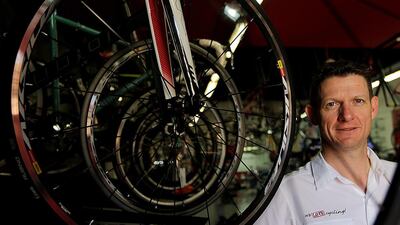ABU DHABI // Effective awareness campaigns and educating road users from a young age could change people’s attitude towards cyclists.
Experts say more people would take up cycling if they were aware of the health benefits, while motorists needed to be taught to treat bicycle users with respect.
Also, both parties needed to learn how to abide by the rules of the road.
Peter Pastijn, a keen cyclist who co-owns The Room health club in Abu Dhabi, said many expatriates avoided an active lifestyle because of the traffic, the climate and the car culture.
Mr Pastijn, a Belgian, said that at home, “for example, if I needed to buy a loaf of bread, instead of taking my car I would ride my bike there and back. But here, this culture doesn’t exist because, after April, it becomes difficult.
“So what could happen is that we learn to integrate a bit of cycling in the colder months of the year into some of our daily activities.”
He also suggested that parents take their children to places such as Yas Marina Circuit’s weekly open day for cyclists, or take them to spinning classes.
Stewart Howison of Revolution Cycles bike shop in Dubai’s Motor City, said there should be more awareness campaigns for motorists to teach them how to drive safely around cyclists.
“Motorists need to understand that cycling is formal transport and we deserve to have some space on the road, just as cars do.
“Drivers need to be educated at driving schools, just as they are taught about pedestrians and children.”
He said the biggest fear for cyclists was other road users – especially lorries and buses – who do not look out for cyclists on the road.
Mr Howison, a Briton, suggested that penalties needed to be increased for reckless motorists.
“Cycling in the UK is very popular because the government supports this to reduce the carbon footprint and road congestion by offering cycle-to-work schemes.”
For example, if you cycle to work in the UK the government offers tax rebates on your bicycle, he said.
Mr Pastijn agreed education was important.
“A cyclist is a very vulnerable party on the road. If you hit him he is dead. If you hit the car into a wall, you might survive but if you hit a cyclist, he wouldn’t,” he said.
Thomas Guinto, a keen cyclist from the Philippines, said bike users were also responsible for their own safety.
“As a cyclist I need to be aware of traffic rules because I am putting my life in danger if I am not aware of road rules and signals,” he said.
“Cyclists need to follow rules better that anybody else. I have seen cyclists crossing the red lights when there are no cars.”
That said, he hoped more people would follow him and start cycling on the roads.
anwar@thenational.ae

